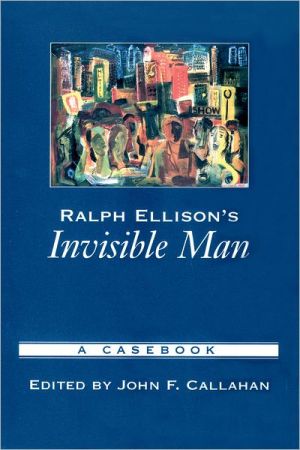

 |

|

The average rating for Ralph Ellison's Invisible Man: A Casebook based on 2 reviews is 4.5 stars.
Review # 1 was written on 2011-07-04 00:00:00 Mark Fincher Mark FincherI think it was William James who said that new theories are first met with repugnance, and then, after some time has elapsed, with the charge of triviality. Certainly, Jerome McGann's theory of textuality has undergone a comparable process of reception. For someone like myself, who has been educated in the shadows of Derrida, Wittgenstein and Quine, McGann's ideas seem pretty uncontroversial. But back in the early 90's, the view advanced within The Textual Condition was met with incredulity and even hostility. The central thesis of the book is this: texts contain two semantic codes, one linguistic and the other bibliographical. Here, an obvious example'which McGann himself invokes repeatedly'is the "poetry" of William Blake (I use the term in its broadest possible sense). Surely, one can detect a certain difference in meaning between (1) a strictly "linguistic" version of "The Tyger" and (2) one of Blake's own illuminated pages. Naturally, with most other texts the difference will be more subtle. Nevertheless, McGann argues that each and every literary work is fundamentally a cultural object, which means that the myriad aspects of its textuality'from typography to publication history'all possess varying degrees of semantic significance. The arguments he provides in support of this claim are largely compelling, but they probably don't merit an entire book of their own. Indeed, much of The Textual Condition originally appeared in the form of shorter pieces'lectures and essays'which results in a degree of redundancy across its chapters. Additionally, while McGann's "textual materialism" is a respite from the world of "high theory," his attempts to engage with the more abstruse (and contemporaneously popular) varieties of literary criticism now come across as tedious and dated. That being said, this book constitutes an immensely important work within the field of textual studies, for McGann was one of the first theorists to point out that yes, the discipline does in fact rely on certain theoretical assumptions. How trivial a claim! And despite its several faults, it remains a groundbreaking and (mostly) eloquent work of criticism. Recommended for only the most die-hard of literary theory fans. Anyone else would likely be bored to tears. |
Review # 2 was written on 2016-09-30 00:00:00 Tristam Niederer Tristam NiedererQuite possibly the only time I've ever silently screamed "I don't care!" while reading. |
CAN'T FIND WHAT YOU'RE LOOKING FOR? CLICK HERE!!!